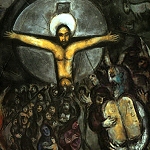|
The other evening my wife and I were discussing the role of tradition in our lives as Messianic Jewish believers. Are we to be "legalistic" in our observance of such matters as Shabbat, Torah reading, celebrating the holidays, and so on? Doesn't that impede the free flow of the Spirit? Why should we be tied to the Jewish calendar and ways of reckoning time? Are we obligated to think and act this way?
Asking such questions can lead to more general thinking about the role of human tradition itself. After all, we are historical creatures rooted in a particular culture, endowed with a specific heredity and unique genetic code. We subconsciously inherit norms, customs, ceremonies, decorum, routines, patterns of speech (e.g., accents), right "from our mother's knee." In short, we are all "creatures of habit," and without such psychological ritualizing, it's likely we would go insane... Our very use of language itself -- and therefore the way we describe seeing, hearing, tasting, feeling, etc. -- is based on customary forms of conventional usage. The bottom line seems to be that we are products of our culture from the moment we take our first breath in this world... Tradition -- of some kind or another -- is simply an inescapable and omnipresent fact of our existence.
But what about the words of the Holy Scriptures? Don't they transcend cultural factors? Are they not timelessly true and exempt from culturally conditioned ways of reading them? Hardly. Both Christianity and Judaism (as opposed to some other religions) do not worship a "book" that "floated down" from heaven complete with chapters and verses. Nor do we believe in a "divine dictation" theory that claims the Scriptures are "Xerox" duplicates of the words spoken by an angel or other divine being. No, the Scriptures are regarded as the products of history -- sacred history, of course -- but history nonetheless. Therefore we have the same problems trying to discern the meaning of the Scriptures as we do for any other type of literature: Who was the original author and the intended audience? What were the cultural circumstances? Why was this written? What kind of writing is it? Is it a poem (like a psalm), or perhaps an instructional maxim (like a proverb)? Am I reading an historical account, a description of a religious ritual, or something else? First we must know what we are reading - and to understand its historical context. Ignoring this simple rule leads to all sorts of errors in our reasoning and makes us unwitting victims of our own cultural biases. We will find ourselves "reading into" the Scriptures things that just aren't there, chaverim!
Regarding the literal words of the Scriptures, it's important to remember that the decisions made regarding which scrolls were "canonical" (and therefore to be included in our modern Bibles) came from the decisions made by earlier faith communities -- just as such decisions likewise preserved the sanctity of the sacred texts themselves. For instance, without the Jewish scribal transmission known as the masorah (ū×ųĖūĪūĢų╣ū©ųĖūö), it's unlikely we would know how to read and interpret many passages of Scripture today (Christianity also has its own scribal traditions that preserved the transmission of the Greek New Testament). Original Hebrew did not include vowel markings or other punctuation. Neither did the Greek of the New Testament, for that matter. Indeed, we can only understand the message of our faith through the medium of historical continuity, tradition, and ongoing dialog.... This was true even in the days of Yeshua, who endorsed the traditional tri-fold division of the Jewish Scriptures (the Law, Writings, and Prophets - Luke 22:44) and relied on Jewish tradition to teach great truths about his message (e.g., he associated the Passover seder with the "Last Supper" rituals of the New Covenant; he called himself Living Water and the Light of the world during Sukkot, and so on.) Yeshua placed high value on the "jots and tittles" of the texts of Scripture that were part of the spiritual heritage of his day (Matt. 5:18).
But didn't Yeshua condemn the "traditions of men" in His day? Didn't he reject the traditions of the elders of Israel (Mark 7:5-13)? Didn't he rhetorically ask the religionists of his day, "Why do you break the commandment of God for the sake of your tradition" (Matt. 15:2-10)? Yes he did, but it's important to understand the historical context of these sorts of statements. First, he was certainly not condemning "true traditions" that are outlined in the Scriptures themselves. Yeshua's entire ministry was predicated on the "appointed times" of the LORD and their fulfillment in him. "Do not think that I have come to abolish the Law or the Prophets; I have not come to abolish them but to fulfill them" (Matt. 5:17). No, what Yeshua appeared to take issue with was the dogmatic interpretation of various aspects of ritual law and with the practice of "building of fences" around the original intent of the Scriptures. These man-made "fences" (gezerot) actually created a gilded cage around the Scriptures and effectively relocated the source of authority to the self-styled religious interpreters of the day... This was the crux of the disagreement between Yeshua and the Pharisees. (For more about this, see "The Heart of the Law; the Law of the Gospel".)
We all live by hours of the day, days of the week, seasons of the year, and God has revealed cycles and patterns of community life for Israel. Indeed, the moedim (festivals and appointed times) of the LORD are rooted in history and have prophetic implication for our lives. The "traditions of the elders" which Yeshua condemned had more to do with hidebound interpretations of the Scriptures (later embodied in the "Oral Law") than with the idea of tradition itself. The Greek word for "tradition" (ŽĆ╬▒ŽüßĮ▒╬┤╬┐Žā╬╣Žé) is a neutral term, simply meaning "handing down" (from ŽĆ╬▒ŽüßĮ▒ (down, from) + ╬┤ßĮĘ╬┤Žē╬╝╬╣ (to give)) what was given before. Both Judaism and Christianity hold to an "oral tradition" following the ministries of Moses and Yeshua, respectively. Because of the imminent expectancy of the return of Yeshua after His resurrection, the gospels were not committed to formal writing until the prospect of the death of the eyewitnesses loomed large. Moreover, there were numerous Gospel accounts which were eventually compiled into a standardized retelling of the story (Luke 1:1-4). In Jewish tradition, Moses received the written law at Sinai, but this cannot be understood in a vacuum. For instance, the details about how to construct the furnishings of the Tabernacle are not given, and the written law even endorsed the establishment of "judges" to interpret case law and establish precedent. Likewise the Apostle Paul admonished, "Therefore, brethren, stand fast, and hold the traditions (ŽĆ╬▒ŽüßĮ▒╬┤╬┐Žā╬╣Žé) which ye have been taught, whether by word, or our epistle" (2 Thess. 2:15, 1 Cor. 11:2). Indeed, in a New Testament sense, "tradition" refers to the Apostolic teaching in general, as well as the valid inferences from the Tanakh that are thereby implied (2 Tim. 3:16, Matt. 13:52).
Much of how we engage the relevance of tradition depends on our motives, of course... If we use religion to impress others, we're obviously missing the point of it all. Spiritual pride is an oxymoron of the highest order... (This also works the other way around: those who are iconoclastic regarding tradition may also be guilty of spiritual pride). Or if we are attempting to earn "merit" or find our self worth before the LORD, we are again missing it. God's love for us is unconditional, and there's no "merit" (zechut) we possess beyond that which is freely given to us through the intercessory work of Yeshua as our High Priest (Eph. 2:8-9). As Isaiah says (64:6): "All our (personal) righteousness is as filthy rags" (i.e., k'beged idim - as a menstrual cloth) -- and yet God loves us and finds us infinitely worthy.... There's no need to "ingratiate ourselves" before the LORD by means of performing various religious observances. God's love is forever the foundation. That said - and I hasten to add this in the same breath - if we love the LORD and honor His Word, we will surely strive to become more and more conscious, aware, mindful, etc. of the "whole counsel of God" and His revealed will. And that, of course, involves becoming more aware of the Jewish roots of your faith.
After all, didn't the LORD God of Israel spend nearly 2,000 years before the advent of the Messiah teaching and grooming Israel? And to what end? Or do you suppose that Israel is a "failed social experiment" meant to be an "object lesson" for Christians? (Alas, this is the "cartoon version" of ethnic Israel that is all too common in the Christian church these days.) Is that all we can say about God's covenants and actions performed on behalf of the Jewish people? Is that all we can say about Israel's future? God forbid. No - though righteousness was not attainable by means of observing the covenant at Sinai, that's no fault of God nor of the Torah! The Torah is "holy and just and good" (Rom. 7:12) -- and that goodness / kedushah (holiness) is not diminished by means of the "better covenant" (Heb. 8:6) which God has graciously provided in concession to the weakness of our human "flesh" (Rom. 8:3-4). If I've warned you before about the perils of legalism, now I need to warn you not to confuse the liberty of the new covenant with any form of "replacement theology" that nullifies God's saving acts and promises for the Jewish people. It's a balancing act on this issue, chaverim...

So where am I going with this? Well, in the second of this week's Torah readings (Pekudei) we learn that Moses consecrated the Mishkan (Tabernacle) on Rosh Chodashim, "the first day of the first month of the second year [since the Exodus]" (Exod. 40:17). The Jewish commentator Rashi notes that Moses spent the entire week before this date assembling and then (on the same day) dismantling the Tabernacle, perhaps to instruct the Levites. Some scholars have suggested that Moses' actions were a parable, however. The Tabernacle was not a "home" for God like some shrine for a tribal deity. Metaphorically it represented the Presence of the Shechinah in the midst of the people (Exod. 25:8). "Let them make me a sanctuary so that I may dwell in their midst." It is the LORD as dwelling in the midst of the people that is the true Presence of God, not some man-made structure, no matter how beautiful. The Shechinah dwells within our hearts and is no longer confined to a Temple. We are now personal "mishkans" -- "living stones" of God's greater Temple (1 Pet. 2:5). The Spirit of God dwells within us through faith....
Nonetheless Moses' object lesson remains. Seven times the Tabernacle was set up only to be pulled back down... "Though the righteous fall seven times, they will rise again," said King Solomon (Prov. 24:16). We strive to move ahead in our spiritual lives, even if we experience repeated setbacks. Even if our lives are shattered by failure, we can take hope, chaverim: God will help you rebuild! (None of the king's men can put Humpty-Dumpty back together again -- but the LORD surely can!) A midrash says that Moses was once tested to see if he was able to receive the Torah. For 40 consecutive days he would study Torah only to immediately forget all he learned! Eventually, however, he remembered his studies and God began preparing him for his role in the kingdom. So take heart and "keep pursuing the goal in order to win the prize offered by God's upward calling in the Messiah Yeshua" (Phil. 3:14).
Now let's go back to the original question we were asking ourselves the other evening. Should we be tied to the Jewish calendar and ways of reckoning time? Are we obligated to think and act this way? Well, even though we might have to "build and rebuild" our own sense of sacred space within ourselves (our "inner mishkan"), it is not hopeless to begin to do just that.... We can (of course) opt out and simply repeat the mantra "Jesus loves me just the way I am" all day long, but while it's indeed gloriously true that God's love for us is unconditional, remaining satisfied with our condition is actually a sign of sickness. The life of authentic discipleship is a one of "hungering and thirsting after righteousness" (Matt. 5:6), a sort of "divine discontent." The Apostle Paul wrote: "When the appointed time arrived, God sent forth his Son, born from a woman, born under the law, to redeem those who were under the law, so that we might receive adoption as sons" (Gal. 4:4-5). Being adopted into God's household means understanding how the house "sets its clock," so to speak. It means being attuned to the rhythm and order of the seasons, days, and even hours of the day. Since the end of our salvation is adoption -- our new identities as sons (and daughters) of God -- is it correct to think it a form of slavery to be mindful of such things, chaverim?

There is legalism -- i.e., the idea that we are duty bound to perform certain rituals, behave a certain way, follow a set of rules, etc., and there is the liberty we enjoy as the heirs of God. There is a higher way of understanding the same thing -- namely understanding as an adult rather than as a child. Apprehending your identity as a son (or daughter) of the LORD God of Israel makes you no longer an outsider, a "child," an "outcast," etc., to the covenantal obligations and promises given to the Jewish people. As a co-heir and fellow member through adoption into the household of God, you are a new creation. Being a Jew is a matter of having a new heart, chaverim....

Let me make this up close and personal. Does it matter -- really -- if we bother to make time for Shabbat? Should we go through the trouble of preparing a special dinner, getting the family together, inviting a friend over for table fellowship and discussion about the ways of the LORD? Does it matter if we light Sabbath candles, eat challah, and say the "prescribed" blessings? Isn't this "tradition" that comes from the rabbis who rejected Yeshua, after all? "Let every person be fully persuaded in his own mind" (Rom. 14:5). There is a "weaker brother" issue here and showing respect for others means avoiding "ma'arit ayin" - the appearance of evil. We are at liberty to identify ourselves with God's overarching plans for Israel by honoring such traditions, and we are also at liberty to abstain from such -- though in either case we seek to sanctify the LORD and give Him honor according to the best lights we have....
God has promised to give us wisdom if we sincerely ask Him (James 1:5-7).
|




